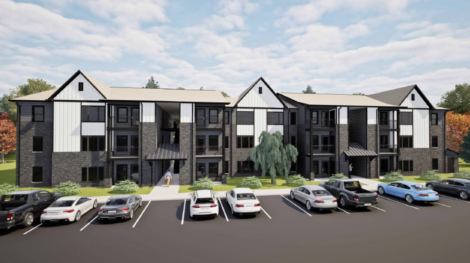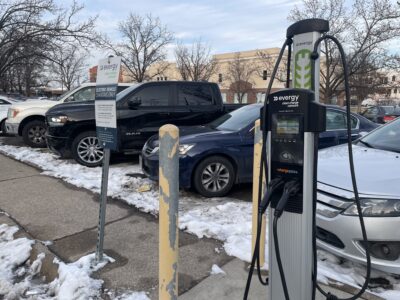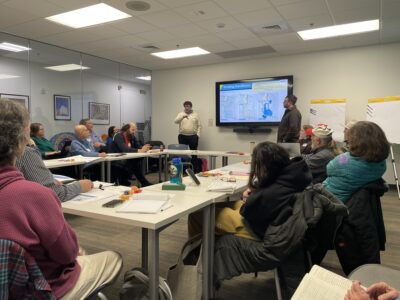In joint forum, candidates share ideas for how Lawrence City Commission and school board could work together
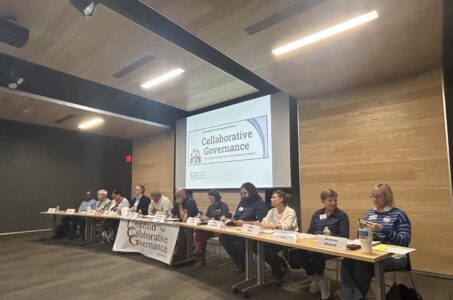
photo by: Bremen Keasey
Candidates for both the Lawrence School Board and the Lawrence City Commission answered questions during a joint candidate forum at the Lawrence Public Library, 707 Vermont St., Wednesday night. The forum was hosted by local advocacy group Coalition for Collaborative Governance and featured questions about collaboration and public engagment.
At a combined forum hosted by a local advocacy group Wednesday, Lawrence City Commission and Lawrence school board candidates discussed issues relating to better collaborations between the governing bodies and how to improve community input.
The Coalition for Collaborative Governance, a group of Lawrence residents that advocates for greater governmental transparency and community engagement, hosted the event at the Lawrence Public Library, 707 Vermont St.
All four candidates vying for one of two seats on the City Commission — Michael Courtney, incumbent Bart Littlejohn, Kristine Polian and Bob Schumm — were in attendance. So were all seven school board candidates — incumbents Kelly Jones, Shannon Kimball and Bob Byers, and challengers ChrisTopher Niles Enneking, Matt Lancaster, Pam Shaw, and Molly Starr — who are competing for three available seats.
Holly Krebs, the lead organizer of the Coalition for Collaborative Governance, asked the candidates questions on three key topics: public engagement, collaboration between government entities and transparency. Krebs said the candidates had been given these questions ahead of time to formulate their answers. Additionally, each of the candidates answered questions submitted by members of the audience. Around 50 people were in attendance, and audience members were able to chat with candidates one-on-one afterward.
Here were the big themes from the forum.
School board candidates want more say in city issues
All of the candidates for school board said they wanted to be more involved in city government issues that affect public schools.
The candidates all said they were interested in having more scheduled times for the school board and City Commission to get together, but the incumbents noted that meetings had been hard to come by in recent years. Byers said that during his first stint on the board in 2009, the two bodies used to meet weekly. In his current term on the board, however, they have “yet to meet.”
Byers said the two bodies “have a lot they need to talk about,” and while he wouldn’t necessarily want to be in the middle of the city’s budget discussions, he thinks it is important to be a part of the planning stage. Jones and Kimball agreed; both said that goals like adding more housing are related to the district’s needs of bringing in more families and creating affordable housing for staff.
Kimball said that during the creation of the city’s new Land Development Code that was passed last November, the school board asked for a district representative to sit on the board that was developing the code, but they were told no. She said it often feels like the city and the Douglas County Commission don’t look at the school district as a partner, and that is something she would want to fundamentally change.
The other candidates also said they wanted to see more collaboration and understanding. Enneking, for instance, said he had already met with all of the City Commission candidates. Lancaster said the two groups should hold joint town halls to hear from residents, and Starr said she especially felt that the school board’s facilities committee should have standing meetings with the city to discuss how tax dollars end up being used. Starr also said she thought the board should have at least one member attend every City Commission meeting as a liaison.
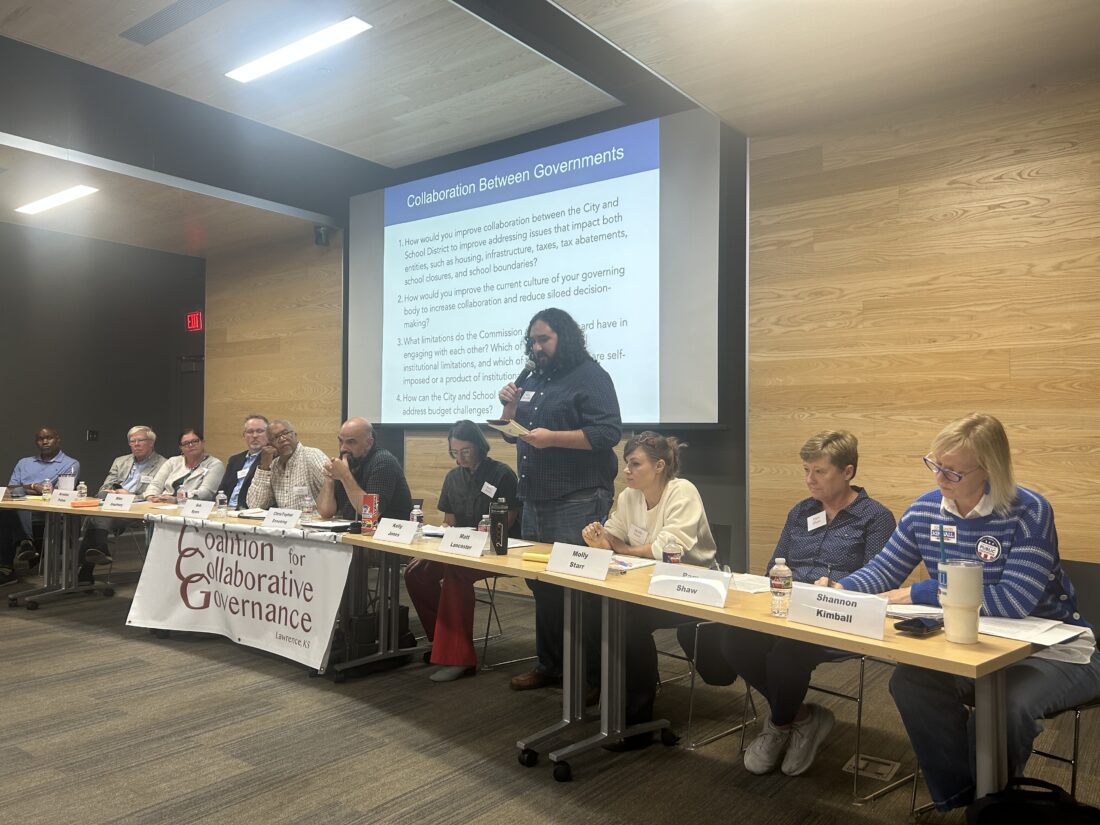
photo by: Bremen Keasey
Lawrence school board candidate Matt Lancaster answering a question during a joint forum held by local advocacy group Coalition for Collaborative Governance. Each candidate had two minutes each to answer questions related to public engagment, collaboration between governing bodies and transparency in government.
Shaw said that when the school district and city government work together, they can help leverage community assets for both, like helping better connect schools with parks, for example. Additionally, Shaw said, the two bodies together could create a “united front” if Lawrence as a whole wanted to advocate for change at a statewide level.
On the commission candidates’ side, Littlejohn thanked the school board candidates for bringing up those issues and said he wanted to find new ways, both formal and informal, to create that dialogue.
Schumm said interaction is important for better community outcomes. He said that if all the various governing bodies ended up raising taxes, the public wouldn’t care which body did it, just that taxes went up. Polian shared a similar sentiment, saying that the three taxing bodies — the school district, city and county governments — need to meet at least once a year. She added that if the governments aren’t paying attention, pitfalls and deficits can come that “can cost people even more money.”
Courtney said this could be a good time for the governing bodies to “have a reset,” and make it a priority to meet. He added that if each government is aware of the projects the other bodies are working on, it can help use those as selling points in recruitment of families or workers, which he believed could help drive economic development.
Candidates share how they would improve public engagement
One of the overarching questions at the forum was how the candidates would integrate public feedback as elected officials, and in what ways they would want to improve the process.
All of the candidates said getting facts and input from the community is important. The majority of them said the best way to get that feedback would be from one-on-one meetings or emails. As Littlejohn noted, most elected officials still have 9-to-5 jobs, so emails work best but they are also good ways to set up those potential meetings.
Littlejohn said that recent city projects, like the process of crafting the 2026 budget, featured good feedback from the public, but that there were a myriad of ways the city could look to improve that process. He said that as a commissioner, he makes “the best decisions when I have the most information.”
Other candidates wanted to improve the opportunities for notifying the public about events in the community or soliciting feedback from them. When the city is considering a rezoning or planning project, it is required to send postcards to nearby residents, Schumm said. He said it could be useful to expand the radius of who receives those notices. Additionally, he thought it would be good to host more town hall-style meetings.
Polian said she would aim to provide more public input opportunities by hosting her own “office hours” as a way to be more out in the community. Courtney also said that since many local government meetings are held at night during the week, it can be hard for working-class families to provide input. He suggested exploring ways to bring feedback opportunities to other places, such as local sporting events, as well as creating pop-up events or working directly with neighborhood associations.
School board candidates Lancaster and Starr had similar ideas of meeting people where they are; Lancaster said he would host “office hours” meetings, and Starr said she wanted to expand the number of community meetings that take place at schools.
Byers said that although the district has lots of opportunities for parents to get involved, it can be hard for them to know how to do it, which is something he’d want to work on. Jones said she thought the school district had been better about implementing feedback and involvement, especially when creating the new cell phone policy and equity policy. Jones also said the district’s work on the ParentSquare app has helped make it easier for parents to see what is going on, and that work came from past worries about a lack of communication.
All the candidates agreed it was important to listen to the concerns. Enneking said because he previously attended and worked at Lawrence schools, he has used a network of people he knows to get direct feedback from many sources. Shaw said active listening and finding shared goals is the basis for good collaboration.
Kimball agreed that in her time on the board, she found “the best way to learn about people is to listen,” and she said that while the process for public engagement is not always perfect, the board is always working to get more input from stakeholders.
The deadline to register or update your voter registration is Oct. 14. Advance in-person voting for the general election starts on Oct. 15 and ends at noon on Nov. 3. The last day to request a mail-in advance voting ballot is Oct. 28.
The general election takes place on Nov. 4 from 7 a.m. to 7 p.m. and will include races for the school board and City Commission.
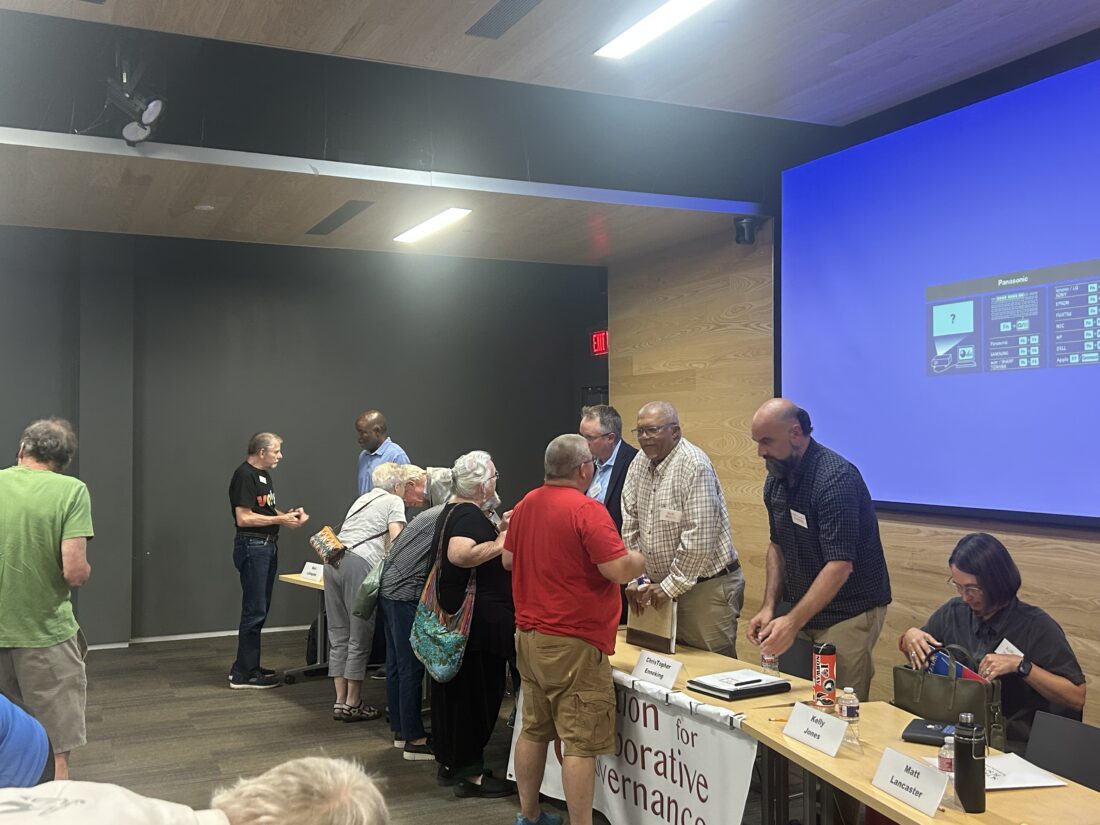
photo by: Bremen Keasey
After the joint candidate forum Wednesday night, audience members had a chance to meet one-on-one with candidates for Lawrence City Commission and School Board.



